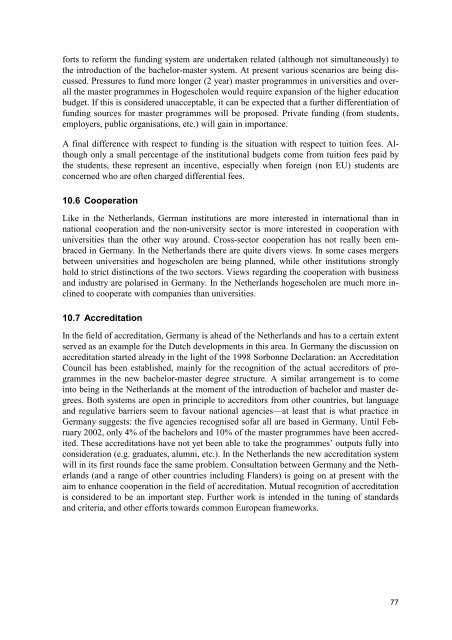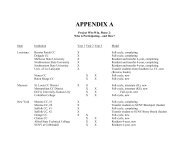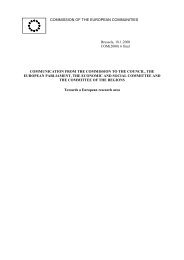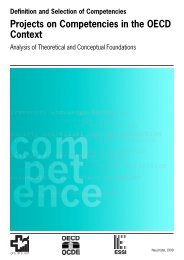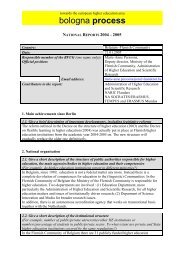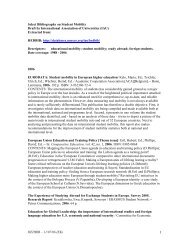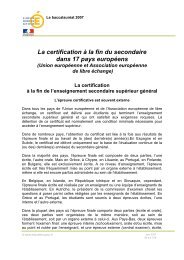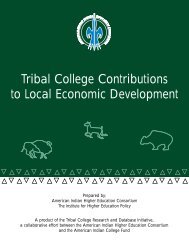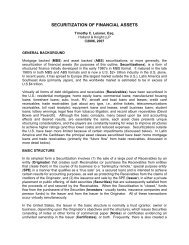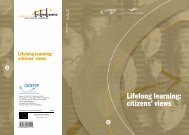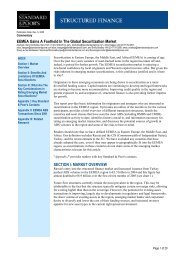and Master Programmes in German Higher Education Institutions
and Master Programmes in German Higher Education Institutions
and Master Programmes in German Higher Education Institutions
- No tags were found...
You also want an ePaper? Increase the reach of your titles
YUMPU automatically turns print PDFs into web optimized ePapers that Google loves.
forts to reform the fund<strong>in</strong>g system are undertaken related (although not simultaneously) tothe <strong>in</strong>troduction of the bachelor-master system. At present various scenarios are be<strong>in</strong>g discussed.Pressures to fund more longer (2 year) master programmes <strong>in</strong> universities <strong>and</strong> overallthe master programmes <strong>in</strong> Hogescholen would require expansion of the higher educationbudget. If this is considered unacceptable, it can be expected that a further differentiation offund<strong>in</strong>g sources for master programmes will be proposed. Private fund<strong>in</strong>g (from students,employers, public organisations, etc.) will ga<strong>in</strong> <strong>in</strong> importance.A f<strong>in</strong>al difference with respect to fund<strong>in</strong>g is the situation with respect to tuition fees. Althoughonly a small percentage of the <strong>in</strong>stitutional budgets come from tuition fees paid bythe students, these represent an <strong>in</strong>centive, especially when foreign (non EU) students areconcerned who are often charged differential fees.10.6 CooperationLike <strong>in</strong> the Netherl<strong>and</strong>s, <strong>German</strong> <strong>in</strong>stitutions are more <strong>in</strong>terested <strong>in</strong> <strong>in</strong>ternational than <strong>in</strong>national cooperation <strong>and</strong> the non-university sector is more <strong>in</strong>terested <strong>in</strong> cooperation withuniversities than the other way around. Cross-sector cooperation has not really been embraced<strong>in</strong> <strong>German</strong>y. In the Netherl<strong>and</strong>s there are quite divers views. In some cases mergersbetween universities <strong>and</strong> hogescholen are be<strong>in</strong>g planned, while other <strong>in</strong>stitutions stronglyhold to strict dist<strong>in</strong>ctions of the two sectors. Views regard<strong>in</strong>g the cooperation with bus<strong>in</strong>ess<strong>and</strong> <strong>in</strong>dustry are polarised <strong>in</strong> <strong>German</strong>y. In the Netherl<strong>and</strong>s hogescholen are much more <strong>in</strong>cl<strong>in</strong>edto cooperate with companies than universities.10.7 AccreditationIn the field of accreditation, <strong>German</strong>y is ahead of the Netherl<strong>and</strong>s <strong>and</strong> has to a certa<strong>in</strong> extentserved as an example for the Dutch developments <strong>in</strong> this area. In <strong>German</strong>y the discussion onaccreditation started already <strong>in</strong> the light of the 1998 Sorbonne Declaration: an AccreditationCouncil has been established, ma<strong>in</strong>ly for the recognition of the actual accreditors of programmes<strong>in</strong> the new bachelor-master degree structure. A similar arrangement is to come<strong>in</strong>to be<strong>in</strong>g <strong>in</strong> the Netherl<strong>and</strong>s at the moment of the <strong>in</strong>troduction of bachelor <strong>and</strong> master degrees.Both systems are open <strong>in</strong> pr<strong>in</strong>ciple to accreditors from other countries, but language<strong>and</strong> regulative barriers seem to favour national agencies—at least that is what practice <strong>in</strong><strong>German</strong>y suggests: the five agencies recognised sofar all are based <strong>in</strong> <strong>German</strong>y. Until February2002, only 4% of the bachelors <strong>and</strong> 10% of the master programmes have been accredited.These accreditations have not yet been able to take the programmes’ outputs fully <strong>in</strong>toconsideration (e.g. graduates, alumni, etc.). In the Netherl<strong>and</strong>s the new accreditation systemwill <strong>in</strong> its first rounds face the same problem. Consultation between <strong>German</strong>y <strong>and</strong> the Netherl<strong>and</strong>s(<strong>and</strong> a range of other countries <strong>in</strong>clud<strong>in</strong>g Fl<strong>and</strong>ers) is go<strong>in</strong>g on at present with theaim to enhance cooperation <strong>in</strong> the field of accreditation. Mutual recognition of accreditationis considered to be an important step. Further work is <strong>in</strong>tended <strong>in</strong> the tun<strong>in</strong>g of st<strong>and</strong>ards<strong>and</strong> criteria, <strong>and</strong> other efforts towards common European frameworks.77


